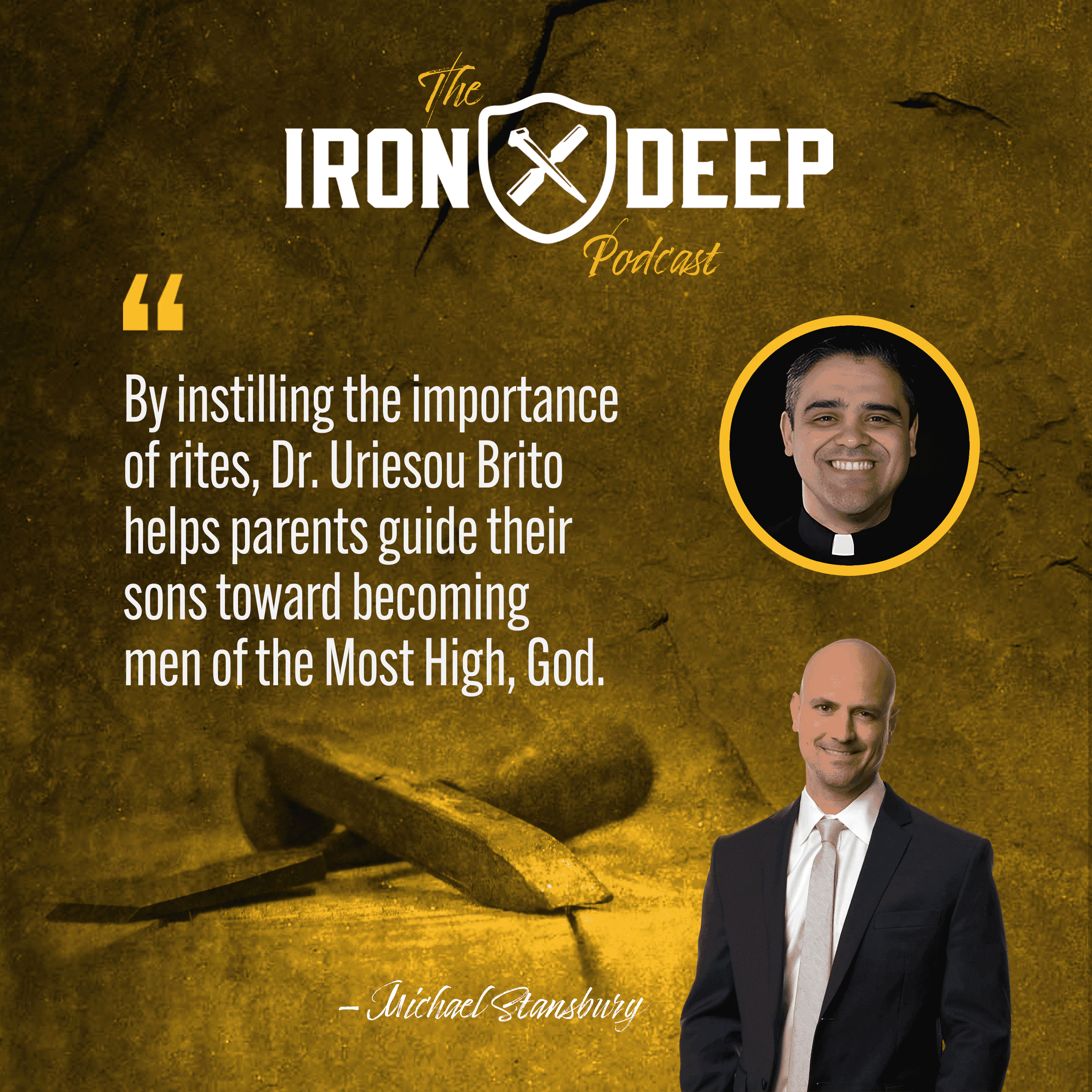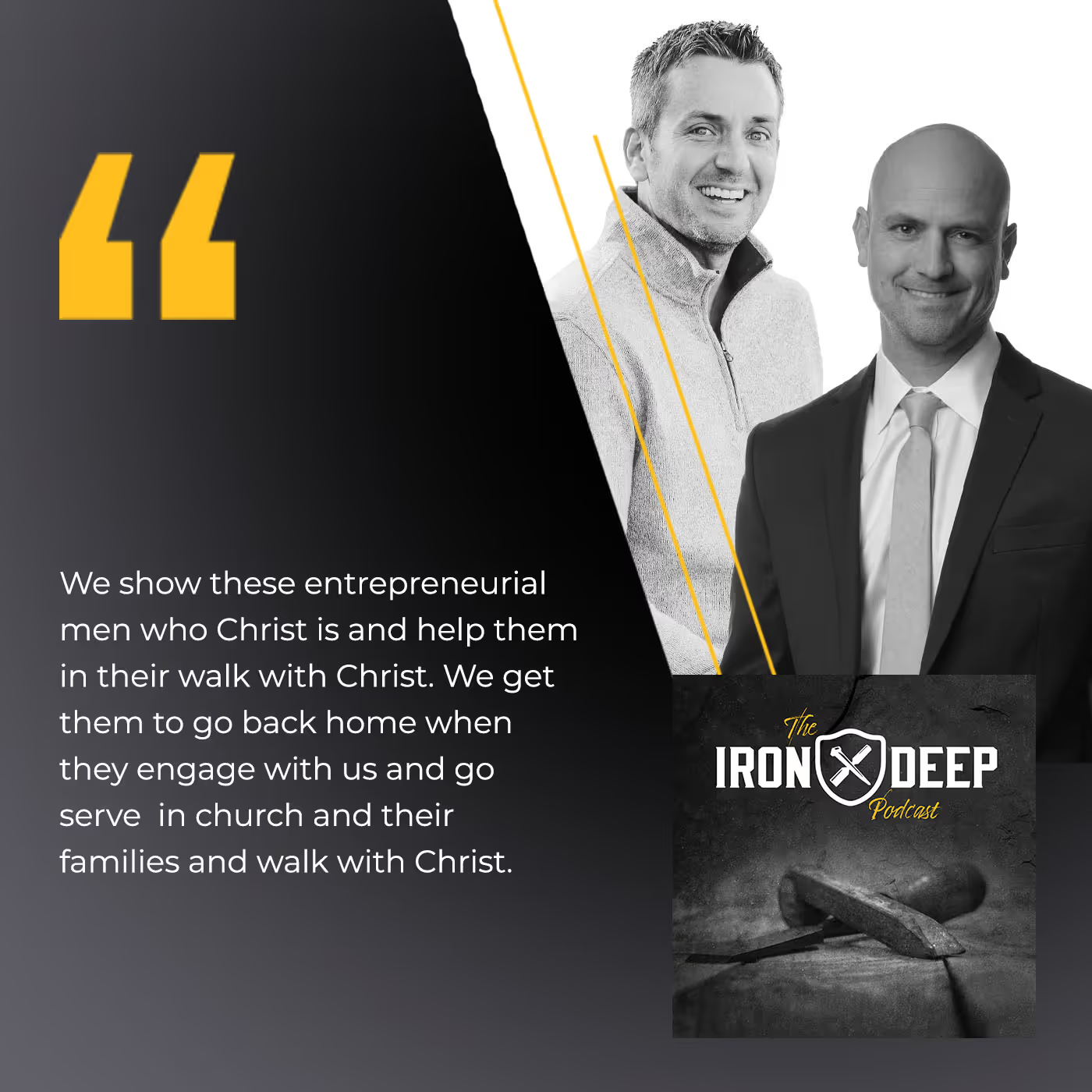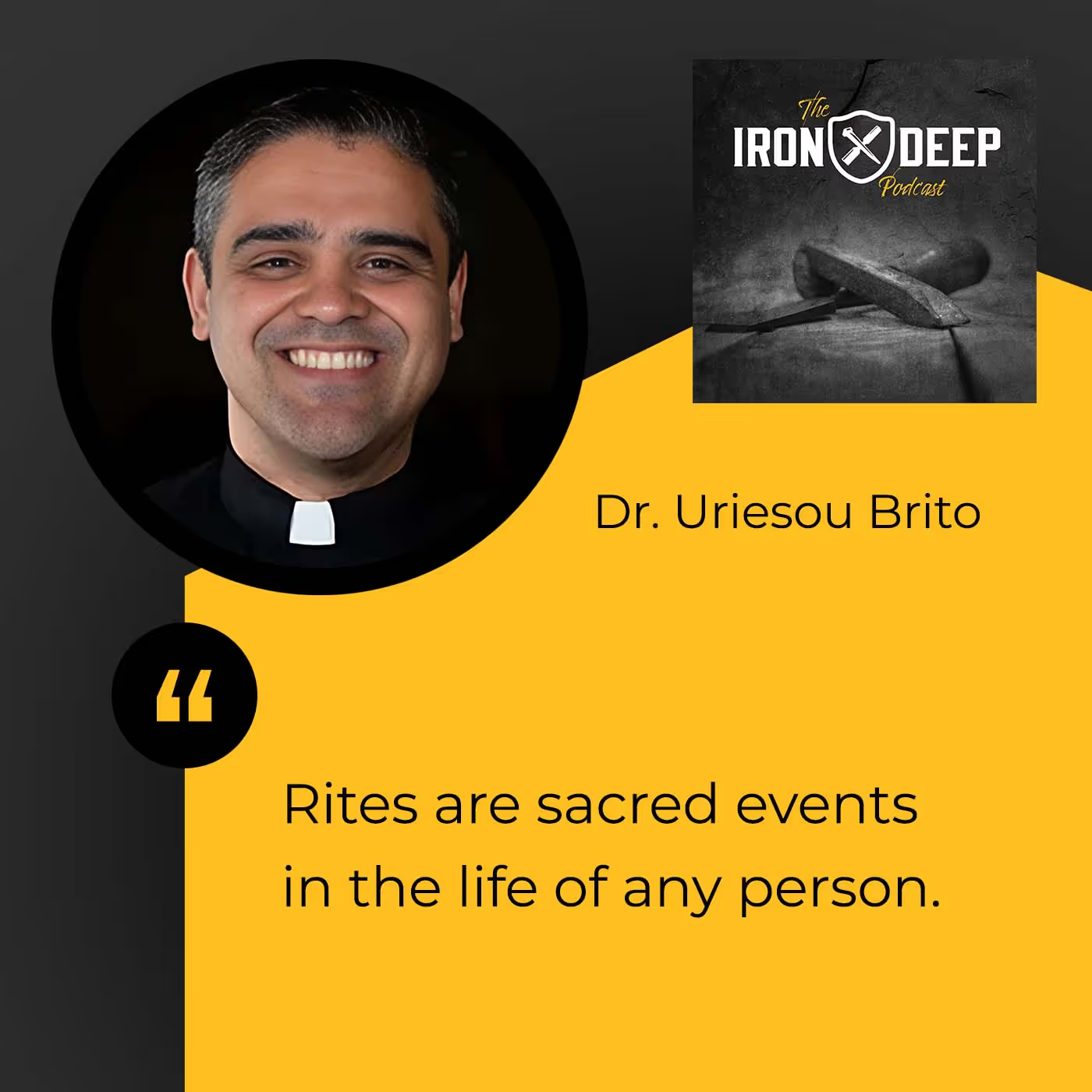Despite all the changes and milestones that happen in our lives, what grounds these experiences are the unfailing and constant traditions and rites. However, it has been said that “there is a de-ritualization of Christian young men in our culture.” How do we overcome that? In this episode, we take on a spiritual lens to zone in on the importance of rites in a man’s life. We sit down with Dr. Uriesou Brito, the Senior Pastor of Providence Church in Pensacola, Florida, to discuss how rites connect men to meaning and, especially as fathers, help guide our sons as they transition into the world of manhood. He also talks about false rites and what we can do to steer away from them and into the path that God meant for us to be. Tune in to this conversation and discover the value of rites now more than ever as changes in our culture attempt to transform sacred traditions.
We have a great guest with us, the Senior Pastor of Providence Church in Pensacola, Florida, Pastor Uri Brito. Pastor Uri, thanks for joining us on the show.
Mike, thanks so much. It’s a joy to be with you.
First of all, I’d love for people to get an introduction about who you are, what you’re doing down there in Pensacola, Florida, and a little quick bio on Pastor Uri.
Thank you again for having me. I have been here in Pensacola, Florida for many years. I’ve lived in Florida for quite some time and lived a season in Central Florida as I was working through some graduate studies. I also lived in Clearwater and a few other parts of Florida. I can say without any hesitation and it might offend a little bit of our Central Floridians, but the Panhandle of Florida is undoubtedly the finest place in Florida. Right now, it’s around 48 degrees outside, so you get to experience a little bit of the seasonal joy that comes with the colder season of life here in Florida.
My congregation is part of the communion of reformed and evangelical churches. We are a reformed evangelical denomination that has been in existence for many years. I have the distinct privilege of serving as the Presiding Minister of the entire denomination, which is now an international body. I have been here in Pensacola for years to a lovely congregation. We have around 330 members. This congregation has loved me and I have loved them. I am the husband of Melinda, who I’ve been married to for many years and I have five wonderful covenant children, 1 young lady and then 4 boys thereafter. It’s a real privilege to pastor but also to be a husband and a father to my little tribe here in Pensacola. Thanks for having me.

You have a second mother. My mom was 1 of 8 and she was the first daughter. She has 6 other kids besides her 3 kids. I will say this. The Panhandle does have the best beaches and we go and visit down there to Santa Rosa and you’re not wrong. I’m with you. I’m rowing that boat with you. The Panhandle is the best part of Florida. You’ve got no detractor in me.
I have been engaging with this idea of covenant children for a while. If someone were to look at that and go, “I wonder what that means,” describe what that means. How do you engage with that if you’ve got a family and you’re in the body of Christ, but you’re not familiar with that term? How would you explain that or execute that?
I’ll give you an elevator pitch and then I’ll elaborate on it. The elevator pitch is that to be a covenant child means that that child is the son or daughter of at least one believing parent. That child, therefore, is by nature of that union and communion, has to God himself is a worthy recipient of the gifts of God. From our perspective, that would include baptism and the Lord’s table as well. That’s the elevator pitch. If you have 30 seconds, that’s it.

To elaborate a little further, to be a covenant child entails certain responsibilities. That responsibility begins with Mom and dad, which means that Mom and dad must fulfill the responsibilities that are given to us in the imperatives. The Apostle Paul in Ephesians, in particular, that they’re to train their children the nurture and admonition of the Lord easily translated into the nurture and the education of the Lord, which is the word pidea.
It means that when Christian parents have children and they bring them into this covenant world, they are not an option, but are compelled by the responsibility to give them by God to raise those children in a distinctly Christian worldview, a distinctly Christian paradigm. That means that that child will only know throughout his childhood and teenage years until he leaves the home, one way of thinking about the world and that is a distinctly Trinitarian Christian way of looking at the world.
It’s not a secular way, not a harmonization of Christianity and secularism, and not an attempt at bridging the Christian worldview with some other philosophical worldview. We do explore all these things, but we explore them through the distinct lenses of the Christian world. There is no compromise there in what education that child is going to receive.
There are particular ways in which this is demonstrated through Presbyterian reformational models, which is my background. I’m a reform minister, therefore, my children are baptized as infants so that they will never know a day where God was not their father and where the church was not their mother, to use the language of Calvin and Augustine.
Our children grew up in this covenantal instruction, which is the same instruction that Jesus received as a young boy, as a nursing infant to his 12th year, and all the way to his 30th year when he was baptized to become a priest and to serve God. In some, to be a covenant child means to be a recipient of God’s gifts. When God gives gifts, he does not spare his gifts. He gives him all very richly for our enjoyment.
I’ve been engaging with this material for the past couple of years and, when I’m looking at some of the reformed theology and doctrines, feeling of the newness of there are some things that I need to meditate on. I grew up Catholic so I’m very familiar with the liturgical way of doing church. I became evangelical and Protestant in my twenties. As I’ve grown up in a more modern church and engaging with this material, it’s new to me but it’s also informing how I engage with my children. I can tell you that how I engaged with them has been covenantal, but it’s never been defined the way you defined it.
It’s more intentional as I engage with this material. I get excited about that whole process because a lot of people that I talk to are worried about their kids. They’re worried about their kids’ salvation. You gave me the elevator pitch. Here’s the question I have for you. You have this modern Christian. He goes to a mega church. They’ve got kids that are struggling with their faith. They may not be coming to church with him. Maybe they say, “You let our kids choose what they want to do.” How would you engage with that person? What would you say to this? How would you talk to this person?
That’s a great question because it’s very pertinent to the evangelical scene in our day. In many ways, I don’t think parents intentionally do these things but a lot of evangelical parents have unintentionally given the reign of their garden or their ship over to their children. It means that from very early on, they’ve allowed the children to take control of how the liturgy of the home functions.
That means children do whatever they please, eat whatever they want, get to go to their own specific church life, and then later on, they may be joined by their parents. The reality is that’s generally not the case. Earlier stages of the life of the children are a much better option, of course, but whatever stage, I always tell parents, “It’s never too late to reassume the authority of the home.” Even if your child is sixteen years old, you can reassume that authority.
It has to be done pastorally as a shepherd, gradually, incrementally, so you don’t change things overnight, but it can be done. At this point, let’s say a father has a child who is taking control of their own little world and the father is very happy to be hands-off. The first step is that the father needs to meet that son or that daughter and repent to that son or that daughter for not assuming the responsibilities that God has given him. He has to nurture and admonish that child and train that child in the goodness of God and the education of God.
That repentance will have to come with some distinct features to it. I believe very firmly that fathers ought to repent to their children and that fathers need to set an example of repentance so that children repent as well. Many times, we expect repentance but we don’t model it at home. Paul says, “Follow my example.” It’s because he was living his pastoral example before the nations and fathers need to embrace that as well.
Fathers ought to repent to their children and need to set an example of repentance so that children repent as well.
One of the first things I would do if I were in, let’s say, a big megachurch now with my children is I’m reassuming my authority. I would remove them from specific classes given to them during the time of worship. A lot of churches will offer children’s church, children’s worship, or youth groups during the time when we, as adults, are meeting with God’s people.
I would remove them from that. I would bring them back to the sanctuary as the first tangible application of reassuming that role. I would bring little boys, little girls, and my children back to communing with us during worship, which is where they belong. That would mean that now, at the very least, as a first initial step, we would have a common vocabulary that we would share on Sunday morning.
Rather than Johnny having his own little segregated time and Daddy having their own segregated time, at the very least in this congregation, we would have a common vocabulary to share. It would alter in many ways how we relate to the life of the church together throughout the week. Not only on Sundays but throughout the week. That would be the first step.
The second step, more practically, is to begin at least a weekly time in which dad and mom would meet with the children. You can use whatever name. I would choose a family devotional or a family worship time. That would be the time when mom and dad would sit with the children and read through the scriptures together through the devotional read an ancient prayer from St. Augustine or whomever. Maybe sing a song, whatever is suitable for that particular family structure.
I would begin by reorienting the two fundamental aspects of the life of the family. First and foremost, the life of the church, and then second, the life of the family. If we are able to reorient and bring together a vocabulary that’s common at church and at home, at the very least, these are two ways in which you can begin to reestablish the authority structures ought to be in the home.
The first step is repentance. It’s like, “I’ve got this wrong, kid. I’m coming to you to tell you I got it wrong.” You’re right. I know that you talked about your wife earlier and your five children. I love having a great wife because they point out things that you need to do and you do them right away. She points out to me and she’ll say, “That wasn’t a good idea. Maybe you need to go apologize.” “I don’t want to apologize. I’m the dad.”
The kids need to see it because, like you said, it’s modeled. That’s great. I do appreciate that. I’m glad that we talked about the covenant children and we talked a little bit about how to reassess and then those two steps that you talked about. The one thing I engaged with you online because I saw this post that you made that I thought would be good for a lot of our audience to know.
Our audience is men, specifically, but not all. They are real estate entrepreneurs in the real estate entrepreneur space. Iron Deep is there to show these entrepreneurial men, who Christ is, and help them in their walk with Christ. We get them to go back home when they engage with us and go serve in church and their families and walk with Christ.

This specific thing that we talked about, I’ll read this and then we’ll engage with it. “There is a de-ritualization of Christian young men in our culture. They grow up without rituals and grab onto the first sign of ritualized culture, whether it be wokeism or socialism. Every system of thought shares common practices and liturgies. Some are distinct, others lack thought and intentionality. In the vast evangelical experience, our young men are reflecting the de-ritualization of church life. As the church goes, so goes our young men.”
Dru Johnson notes in his book, Human Rites, that we need to know our rites and to know our rites, demand the exercising of meaningful rites in the community. We can belabor the point of raising godly young men, but without grounding them in godly traditions, our young men may easily find themselves grounded in their expressive individualism.
The more we understand our rituals, the more meaningful they become. The more our young men remember who they are through these rites, the more they will meditate on their meaning and the more stabilized they will be in their Christian culture. Your oldest son turned 13 and wanted to see that turning 13 was a rite of passage and transitioning to a world of manhood. Beyond that, I wanted him to know that becoming a mature man is not the task of isolation. It’s a community right and a shared glory with others.
I didn’t want this stage of life to be passed by without making it. I invited my church officers to come to our house and pray over him for the sobering charge him in the presence of many witnesses. We sang hymns about warfare and celebration. We had a toast with champagne. I’ll never forget this evening and I trust he will never forget that life is not a series of empty symbols, but a full and rich aroma of substantive rituals that shape your existence from baptism unto life to baptism unto death.
Rituals comprise our way of being. Rituals are established to orient the people we hope to be. Our children need to be bathed in rites. They must look back and see that older men were there, sharing that moment and cheering them through sacred moments. Rites mark our life stages and should be meaningful enough for our young men to pass on to their boys as well. It should be meaningful enough to keep them from chasing false rites. False rites, what are these kids chasing? Describe it a little bit. What’s false and then what’s the true ones that we need to be engaging in?
Rites are sacred events in the life of any person. Every religious system has it, Mike. Christianity being the central one but you see these rites in every tradition. You see it in Buddhism, Bahaism, and in events in schools. You see them everywhere. It’s inescapable. That’s the first thing I want to point out to any evangelical reading this conversation. These are inescapable things. We all do them. Sometimes, they’re stupidly done. Other times, they’re intentionally done.

What are the kinds of rites that our people are choosing now? Rites are generally formed by communities. What’s happening very often with our young men is that they’re choosing false rites. By doing so, in the case of community, for example, they’re choosing false communities. These false communities are also going to have sacred rituals attached to them.
It could be a gang or any structure that makes them feel welcome or at home. It could be at a party where drunkenness is going to be the central feature or the central rite of the evening. In other words, they are constantly bombarded by these kinds of things. A lot of our young men in our days are finding rites or communities within the gaming world. They’ll be in their rooms from 9:00 PM to 4:00 in the morning, having this communion with people from all over the world, playing whatever game it is that they find themselves compelled to.
Rites are inescapable and communities are going to form these rites and these rites are going to propose righteous paths or unrighteous paths. That’s what’s crucial here. We’re talking about a young man whom universities have offered all sorts of rites of passage, for example, whether it be protesting at a BLM event or for anti-life causes.
They’re going to find ways to ritualize your children. As parents, we ask what rites do we want for our children. We don’t have the option of not having them. If we say, “Let’s act as if these are insignificant,” there are people out there who have thought through very carefully through philosophical care and wokeist categories, and what kind of rites are going to bring people closer to them. If we fail to implement them, other eager people will take our place.
Going back to look at how the old church dealt with things and maybe we threw away some things or we put some things on the shelf that we thought, “This is not what the church should be doing. This is not modern enough or what markets enough.” Yet the whole world is doing these things and we have left these things undone in our church with some things.
Specific to boys, the culture is always trying to engage them with these rites, whether it be gaming, college football, fraternity, or all these things. What are some tangible things that, “My church is not doing something like this for young boys, specifically thirteen-year-olds? We don’t have a bar mitzvah type of event that happens for our boys.” What does that look like? How should we engage in that? Tell us a little bit more about the event that you held for your boy and why is it important for that young boy.
That’s significant, again, because almost every culture in the world has something to mark the difference between a boy and a man. We call that a rite of passage. It’s a transition where he becomes a man. We’re not talking about the transition that he becomes a Christian. We’re not talking about the age of accountability. We’re talking about a rite of passage that we can say tangibly whatever age traditions can change that.
We chose thirteen because it’s the beginning of teenagehood. We wanted to mark that moment as a way of saying, “I want you to know that daddy has given you responsibilities, but now these responsibilities are only going to grow in these next 5 or 6 years until you leave home. We want to make sure that when you do leave the home, you have already assumed this status of manhood. When the world says, ‘Now you’re a man,’ you look at them and you laugh at them and you say, ‘No, I’ve been a man for a long time.’”
These rites of passages can come with distinct liturgies. In our congregation, we have worked very hard at building young men. Of course, sometimes these things fall through the cracks, but it means that ordinarily, our young men are always in communion with older men. We never have only an adult male Bible study. We have studies that are probably going to be more absorbed by people who have a more developed intellectual life. We invite every single man who is married with children to bring their little children. They get to eat pizza with us and have a barbecue. They get to watch Daddy drink a beer.
They get to be involved in the kinds of rituals that Daddy’s already involved in. They can say, “That’s where I’m headed. As I grow, I’m going to be invested in these things. I’m going to be absorbing these things more. They’re not divorced from me because they are 10 or 20 years older than me. These are my people.”
That means we’re bringing the 40-year-old together with a 12-year-old or a 13-year-old and we’re bringing these communities together. The danger of the evangelical ethos has been that we have become very content in segregating these age groups. That means that the thirteen-year-old doesn’t have the ability to grow in his knowledge of different things. I want my boy, who is very eclectic, to have interactions with an engineer or somebody who does coding for a living.

I want him to be exposed to these things in a way of accentuates his desires and passions so that he can be what I call in one of my books a happy generalist. When the first of four boys turned thirteen, we wanted something that would encapsulate this transition. I found out this later, but Vern Poythress, who was a professor of Westman Seminary in Philadelphia, calls it Bar Jeshua or the son of Jesus. This is the transitioning phase. Instead of Bar Mitzvah, it’s the son of Jesus in the Christian world.
One of the unfortunate effects he talks about in our culture is that our boys are highly insecure. One reason they’re insecure is because they don’t know when they become men. Since our children grew up in this insecure world, that means that at the age of nine, they start looking at pornography. They think, “Now I become a man.” That’s not how things ought to be. They ought to live in this environment where they’re able to determine through a rite of passage when they have become men.
What we did was we invited the men of our church, specifically the officers, deacons, elders, and pastors to come to our home. They were very gracious to take 30 minutes to an hour and a half of their afternoon to come over. We gathered together. We begin with a hymn. One of our favorite hymns in our congregation is the Son of God Goes Forth to War. Another one is Rise Again, Ye Lion-Hearted. It’s hymns that stir the appetite for mission among our men.
I offered him a charge that lasted around 4 or 5 minutes. I then invited all the men who were present, and there were about 20 of them, to come to lay their hands on my son. I gave the officers and the men time to pray over him. That took about fifteen minutes. After that, we all got our glasses of champagne or whatever they had in their hands. I offered a toast for the manhood of my son that he would grow into godliness, honor, and favor with God and man. That was the end.
After that, we bought a lot of good food and we ate for another hour and a half. We built even more so the status that he is a man, but he’s in communion with other men if they’re 10, 15, or 20 years older. You want to build these rites. It was a simple rite. The little liturgy I put together took about 20 or 25 minutes but it’s something that I think will mark him. I hope also that it will take him back very often when he’s wondering, “What am I? Who am I?” I can point back to saying, “On that day, we marked you as a man of the most high God.”
He has that burned in his memory with all those gentlemen there. That sounds super cool. I go to a great church, but one of the things I did notice is that we do segregate. My wife and I volunteer with high schoolers and teenagers. Sometimes we’re the oldest people there in that room, 47 and 48 years old. What I find is a lot of these kids gravitate toward us. They want to know what you think.
Some of these kids are going to public education. They’re segregated there as well. They have the teacher there, but they’re not engaged a lot with adults other than maybe their parents. I see the need for the whole body to get together so these kids can engage. I love the old wise guy too, the 80-year-old. I love spending time sitting and hearing his stories as well so I understand exactly why. There should be maybe a pivot there or maybe more focus there on the whole body congregating together and doing things together. That’s good.
There are moments when these things can happen. You can have a bunch of teenagers hanging out. I’m not opposed to these things but I am opposed to the idea that that is the only place they belong. If you put what Proverbs says about the gray hair in our context, it also allows the teenage world which is so fond of being isolated, and frame their world around their TikTok access.
They’re so fond of that. If they are in the presence of older men, they have, in some ways, intellectually submitted to someone else. That’s an important thing as well because what that does is, they don’t have to feel the urgency to interpret reality but they have to feel, at least, some level of urgency of learning from the reality of people who have already been interpreting life for a long time.
They have a little bit of wisdom to share. That’s good. Pastor, I appreciate very much your taking the time to be on our show. Let people know where they can reach out to you and where your blog. Where can our folks find you?
Thank you again for having me, Mike. The place where I am most prolific, apart from my Facebook page, is Kuyperian.com. I have around 20, 23, to 25 writers who write for us at Kuyperian. We have articles on all sorts of issues on raising boys to feasting to Kuyperian theology to eschatology. It’s a pretty broad, diverse assembly of men that I’ve gathered to write for me and they do a wonderful job.
The other place is my Substack, which is called The Perspectivalist. I write there on Tuesdays and Fridays for those who like to follow along. It’s DrBrito.Substack.com. It’s a place where I’m able to put some more personal theological materials. Sometimes, those who are subscribing to it will get early access to a book I’m about to publish or a lecture I’m about to deliver. There’s a bit more of a personal touch to it, but those are the two main places.
Dr. Pastor Uri Brito, appreciate you being on the show. Folks, thanks for tuning in. You can reach us. Please subscribe, like, and do all the things that they tell you to do to make the show go a little further. Thanks again, everybody, for reading.